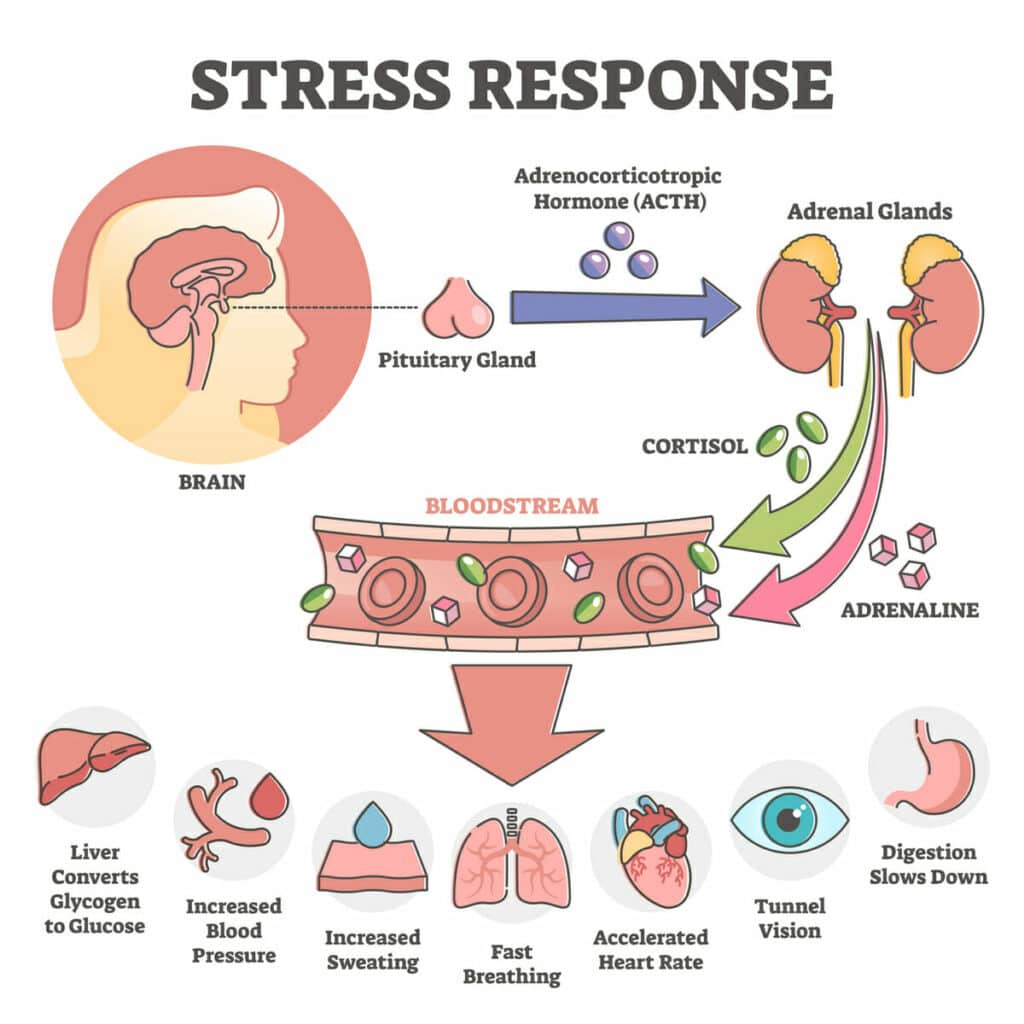
How often do you feel stressed in life? According to some studies, a lot.
According to Apollo Hospitals’ Health of the Nation Report 2024, which surveyed 11,000 individuals, nearly 80 percent of young adults (18-30 years) and seniors (>65 years) reported significant stress levels. Another report, the Indian Wellness Index 2023 by ICICI Lombard General Insurance, revealed that 77 percent of Indians showed at least one symptom of stress and one in three Indians suffered from stress and anxiety.
In a world where stress has become an almost permanent part of people’s way of life, it becomes important to understand how it affects the body and how the body responds to it. One of the most important elements involved in this process is cortisol, also known as the ‘stress hormone’.
What is it?

Cortisol helps the body cope with stressful situations. But that’s not all it does. Dr Sneha Kothari, Consultant Endocrinologist, Gleneagles Hospital, Mumbai, sheds light on the following: “Cortisol hormone regulates the body’s stress response, but it also regulates metabolism and blood pressure, suppresses inflammation and controls blood sugar levels.”
(LR) Dr. Sneha Kothari, Dr. Sarthak Dave, Dhvani Shah
How does this hormone work, we ask Dr. Kothari. “Cortisol is produced by the adrenal glands, which are located on top of your kidneys. It is generally released into the body in response to acute or chronic stress,” she explains.
Normally, the body produces the right amount of cortisol to perform essential functions. However, under high stress, cortisol levels rise significantly.
What happens when you produce too much cortisol?
Long-term high cortisol levels can lead to several health problems. “Increased cortisol levels can lead to both physical and psychological effects,” says Ahmedabad-based psychiatrist Dr. Sarthak Dave.
According to him, some important physical effects are:
• Weight gain, especially around the abdomen
• Higher blood pressure
Psychological effects include:
• Increased anxiety
• Irritability
• Difficulty concentrating
“Long-term high cortisol levels can weaken the immune system and contribute to sleep problems such as insomnia,” he adds.
Watch out for these warning signs
Although the hormone functions internally in the body, the signs of elevated cortisol levels are often visible in the body or in psychological behavior.
“Signs that someone may have elevated cortisol levels due to chronic stress include persistent fatigue, mood swings, frequent headaches, digestive issues (such as stomach pain or diarrhea), and a weakened immune response (e.g., frequent colds or infections),” Dr. Dave informs, adding, “Behavioral signs can include increased irritability, difficulty relaxing, and changes in appetite. Additionally, clinical depression and anxiety and certain mental health conditions have blood findings of elevated cortisol levels.”
It is essential that you are aware of these warning signs and recognize them so that you can quickly diagnose and take the necessary steps.
Small changes to your lifestyle can go a long way: follow these steps to regulate your cortisol levels
If elevated cortisol levels have led to clinical problems, one should consult an endocrinologist or psychiatrist, depending on the symptoms. However, some lifestyle changes can help significantly in relieving stress and regulating cortisol.
“There are several ways to regulate and manage cortisol levels without medication,” Dr. Kothari believes.
• Manage your stress. You can do this by practicing meditation techniques or deep breathing exercises every day. Sitting quietly with your eyes closed for more than 10 to 15 minutes can help you relax and calm your mind. The key is to stop thinking about other things and focus on your breathing patterns.
• Eat balanced meals that include a variety of foods, such as fruits, vegetables, whole grains, proteins, nuts and seeds.
• Staying hydrated is important. Drink plenty of water throughout the day.
• Engaging in hobbies that make you happy can help reduce stress.
• Engaging in physical activity for more than 45 minutes a day leads to the release of endorphins. Endorphins are also known as natural stress relievers and are effective in regulating cortisol levels. Physical activity can include cycling, swimming, running, going to the gym, and even as simple as taking a long walk.
• A healthy sleep routine with at least 7 to 8 hours of quality sleep, going to bed on time and waking up at the same time is crucial for cortisol regulation.
Dr. Dave offers suggestions for ways to reduce stress and regulate cortisol, not just lifestyle changes but also social factors.
• A healthy lifestyle, including eating well, getting enough sleep and limiting caffeine and alcohol intake, helps your body cope with stress.
• A consistent routine or daily schedule can provide stability and reduce anxiety.
• Social support can make a difference. Talk to friends, family or a therapist about what is stressing you out – it can help you gain perspective and feel supported.
• Practice mindfulness or yoga to stay present and reduce the impact of stress.
• Don’t be afraid to set boundaries and say no to things that add too much stress to your life. It’s okay to prioritize your well-being.
Proper nutrition is key
Nutrition plays a crucial role in improving overall well-being and combating health problems. Again, what you eat and drink can either alleviate or increase stress, thus having a significant impact on the cortisol levels in your body.
Dhvani Shah, a Mumbai-based nutritionist, agrees. She shares tips on incorporating the right food habits into your routine to reduce stress and regulate cortisol.
Doing
• If you want to lower your cortisol levels, eat alkalizing foods with more antioxidants like fresh vegetable juice, lots of fruits and vegetables in your meals, ingredients like amla, haldi, ajwain and seasonal fruits like jamun, papaya and mango.
• Essential nutrients
Omega-3, also known as healthy fats, has anti-inflammatory properties and can help lower cortisol. You can find it in nut butters, avocado, olives, fatty fish, coconut, ghee, flaxseed, etc.
Magnesium is another important nutrient that relaxes nerves and muscles and helps regulate mineral balance. You can find it in sprouts, seeds, nuts, etc.
• Waters with cucumber, mint, lemon, jeera, ginger, lemongrass or other herbs that suit your body can help relieve stress. These contain phytochemicals that can be beneficial for health.
What not to do
• Avoid foods high in sugar, processed foods, foods high in fat, alcohol, caffeine, foods high in chili peppers, etc. These can lead to oxidative stress, which causes an increase in cortisol.
• Avoid eating heavy things after sunset. You can eat something light afterwards, like nuts, milk or soup. This gives your body more time to digest cooked food, which leads to a better antioxidant load and less oxidative stress.
The primary requirement for regulating cortisol is managing stress. This requires a mix of proper nutrition, adequate physical activity, favorable social factors, meditation/relaxation techniques, and a healthy sleep routine.
